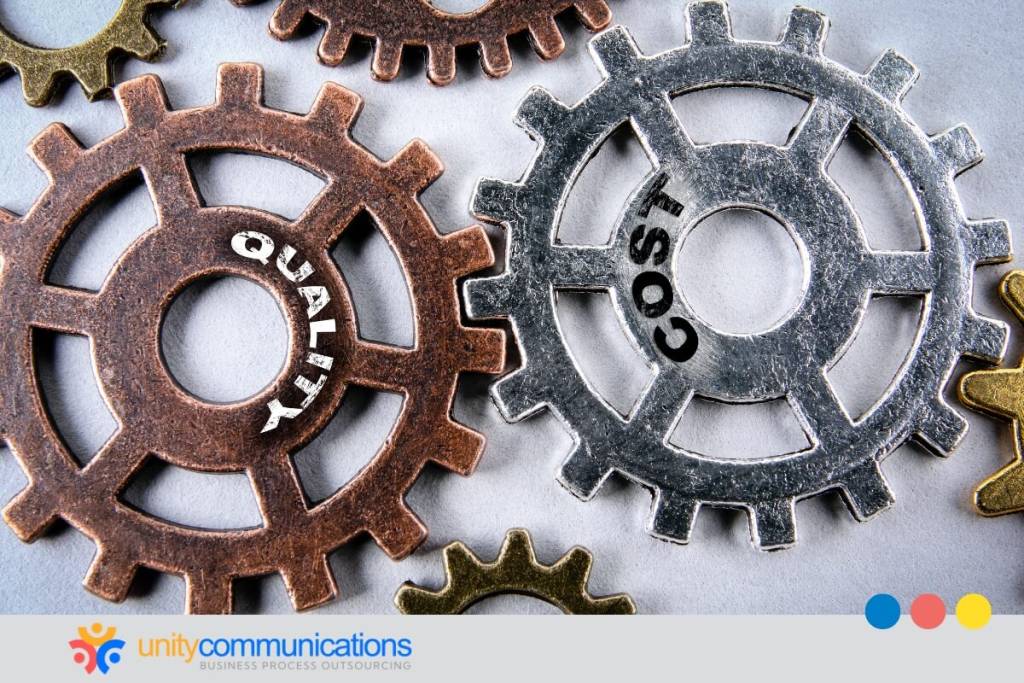IN THIS ARTICLE
Table of Contents
Mexico has emerged as a premier destination for businesses seeking a balance between cost efficiency and quality service, which is essential for market competitiveness.
Consider the third-party workforce: technical professionals, customer service representatives, and virtual assistants in Mexico can deliver high-quality output at competitive rates.
This article explores the best practices for optimizing outsourcing strategies in Mexico to achieve a cost–vs.-quality balance. Keep reading to learn how you can enhance operations while maintaining high standards.
The cost benefits of outsourcing in Mexico

Why outsource to Latin America (LatAm)? The region offers significant savings, especially for U.S. and European companies looking to reduce expenses without compromising quality.
Mexico is a leading business process outsourcing (BPO) destination in LatAm. With its affordable cost of living and sizable labor force, the nation offers lower operating and salary expenses. Its proximity to and cultural similarities with the U.S. are hard to match in other BPO regions.
Lower labor and operating costs than onshoring
A primary reason to outsource work to Mexico is moderate labor costs. The country’s wages are lower than in the U.S. or Europe, and real estate and utilities are more affordable.
- Wages: A skilled information technology (IT) Mexican worker earns around $1,300 monthly, while a counterpart in the U.S. receives $3,800.
- Lower overhead: Due to Mexico’s reasonable cost of living, office space, utilities, and travel expenses are cheaper.
- Fewer logistical issues: Time zone compatibility with the U.S. optimizes costs due to minimized delays.
How currency exchange rates reduce costs for U.S. and European firms
Currency exchange rates further decrease business costs. A weaker Mexican peso (MXN) means you pay less for labor and operations than the U.S. dollar or euro.
- U.S. dollar to MXN exchange: A strong dollar gives U.S. companies more value when paying Mexican workers. For example, a $10,000 expense now costs 180,000 MXN compared to around 220,000 MXN in the past.
- Euro to MXN exchange: European firms also gain from a depreciated MXN, lowering their outsourcing costs in Mexico.
Cost-benefit analysis of outsourcing to Mexico: A hypothetical case
Consider a U.S.-based enterprise outsourcing to Mexico versus onshoring. Here’s a quick cost comparison for a 100-person customer support team:
- U.S. cost: Each employee receives $40,000 annually, leading to a total wage bill of $4 million.
- Mexico cost: Each employee earns $15,000 annually for the same team, for $1.5 million.
This $2.5 million in wage savings alone shows how cost-effective business process outsourcing to Mexico is. It can drastically cut costs while retaining a high-quality workforce. Total savings from lower office expenditures and advantageous exchange rates can surpass 60%.
Quality considerations in Mexican outsourcing
Outsourcing in Mexico involves comparing the costs vs. work quality of third-party teams. As firms strive to control expenses, the quality of outsourced services becomes essential. Access to skilled professionals and effective communication strategies are primary factors that help maintain high standards in Mexican outsourcing.
Availability of skilled, bilingual professionals
The BPO industry in Mexico has a large pool of competent professionals, many of whom are bilingual in Spanish and English. This skill is particularly beneficial for U.S. companies.
- Skilled workforce: Mexico has various colleges and technical institutes that produce engineering, manufacturing, IT, and customer service graduates, making it easy to discover qualified candidates.
- Bilingual ability: Many Mexican professionals can speak fluent English, improving communication and reducing project misconceptions.
- Cultural affinity: Mexico’s closeness to the U.S. implies that its local workforce frequently shares comparable cultural values for quicker and more productive collaboration.
Quality assurance (QA) processes in Mexican outsourcing providers
Many Mexican BPO organizations implement robust QA procedures to maintain high-quality standards. These processes are essential to consistently meeting client expectations.
- Regular audits: Established service providers conduct performance reviews to check the task quality and identify areas for improvement.
- Continuous training: Employees undergo education programs to keep their skills and knowledge up-to-date and aligned with industry standards.
- Client feedback mechanisms: Effective BPO partners encourage client input to enhance processes and service delivery.
- Performance metrics tracking. Third-party contractors use key performance indicators (KPIs) to measure quality and operational efficiency.
Importance of clear communication and expectations in BPO contracts
Effective communication is a prerequisite for building successful outsourcing relationships. Projects can quickly derail without clear standards and expectations, resulting in quality difficulties and higher expenditures.
- Well-defined contracts: A complete business process outsourcing agreement clearly defines roles, duties, and performance metrics, reducing misunderstandings.
- Regular check-ins: Scheduled team meetings align everyone toward a common goal and encourage discussions for timely plan modifications.
- Transparent reporting: Regular progress updates promote transparency, letting clients monitor performance and quality measures efficiently.
- Escalation processes: Thoroughly defined escalation pathways resolve issues promptly and preserve project momentum.
Outsourcing in Mexico: Balancing cost vs. quality

When outsourcing in Mexico, weighing cost vs. quality is crucial to maximize efficiency. Balancing these two factors requires a strategic approach that identifies areas for cost savings without compromising service quality. Several steps can guide you in outsourcing, from identifying savings to picking the right BPO partner and establishing KPIs.
Identifying key areas for cost efficiency
Businesses must identify areas for savings to control expenses while retaining quality. An extensive operational evaluation can identify opportunities:
- Process optimization: Simplifying procedures and minimizing redundancies can help cut expenses while enhancing service quality.
- Technology utilization: Investing in technological innovations and automation can lower labor costs and improve accuracy, improving services at reduced pricing.
- Outsourcing non-core functions: Focusing on core strengths while delegating secondary work allows organizations to use resources more efficiently, resulting in cost savings without compromising quality.
Importance of due diligence in selecting a BPO partner
Companies must carefully choose their outsourcing partner in Mexico to successfully balance cost vs. quality. Proper due diligence enables your business to choose a BPO vendor that meets your budget, requirements, and standards.
- Research potential BPO partners. Evaluate multiple outsourcing firms, examining their expertise, reputation, and client feedback.
- Analyze cultural fit. Your prospective service provider must match your company culture to enhance collaboration and communication.
- Scrutinize performance history. Examine the BPO candidates’ previous projects and outcomes to gauge whether they can consistently deliver quality services according to your needs.
Best practices for setting performance metrics and conducting evaluations
You should also establish performance benchmarks and perform regular assessments with the outsourcing partner in Mexico to achieve cost-vs.-quality equilibrium. This process fosters accountability and continuous improvement to maintain high service quality and manage costs.
- Define KPIs. Set metrics that reflect quality and cost objectives, providing a clear framework for evaluation.
- Do regular reviews. Schedule periodic assessments to check performance against established benchmarks, allowing for timely adjustments.
- Encourage feedback loops. Build mechanisms for receiving client and BPO agent feedback, facilitating ongoing improvements in service quality.
Technology and process automation for QA
The outsourcing landscape in Mexico is dynamic, and technology and process automation are pivotal in attaining and sustaining efficiency.
How technology enhances quality while reducing costs
Technology enables cost reductions and quality improvements in outsourcing. With the appropriate tools, businesses can streamline operations, decrease errors, and provide consistent service.
- Data-driven decision-making: Advanced analytics technologies can help discover inefficiencies and areas for improvement, resulting in better resource allocation and lower operational expenses.
- Cloud-based systems: Cloud platforms allow for real-time collaboration and data access, assuring consistent service delivery while avoiding costly infrastructure investments.
- Artificial intelligence (AI)-based customer support: Chatbots and similar AI-powered applications handle routine customer inquiries, eliminating the need for human participation while maintaining high-quality interactions.
- Remote monitoring tools: These technologies provide real-time tracking of outsourced processes to measure KPIs and determine whether the BPO company followed quality standards.
- Predictive maintenance applications: These tools foresee equipment or service failures to lower operational downtimes.
Automation’s role in improving service delivery and reducing errors
Automation boosts outsourcing efficiency by reducing errors from manual processes. It handles repetitive tasks for faster, more accurate, and more cost-effective service delivery.
- Automated workflows: Recurring processes, such as data input and report preparation, can improve accuracy and speed while decreasing the likelihood of human error.
- Robotic process automation (RPA): RPA tools enable the computerized execution of intricate business procedures, increasing service consistency and lessening manual intervention.
- Quality control automation: Automated systems can monitor production and service quality in real time, detecting problems before they worsen.
- Error detection and correction: Automation tools find and repair faults promptly, reducing service interruptions while maintaining high-quality levels.
- Integrated communication platforms: The tools provide a fluid interaction between third-party BPO teams and clients, keeping everyone informed and coordinated, improving collaboration, and reducing confusion.
- Training automation: Automated instruction courses keep Mexican staff updated on processes and technology, allowing them to retain high skill levels and effectively contribute to service quality.
The bottom line

Outsourcing in Mexico to achieve a cost–vs.-quality balance requires strategic decisions, effective technology use, and strong partnerships, enabling your business to realize sustainable success.
Looking to outsource in Mexico to maximize efficiency? Unity Communications can optimize your operations while providing quality service that meets your business standards at a fraction of the cost. Let’s connect to discuss how our specialized outsourcing services can support your growth!





